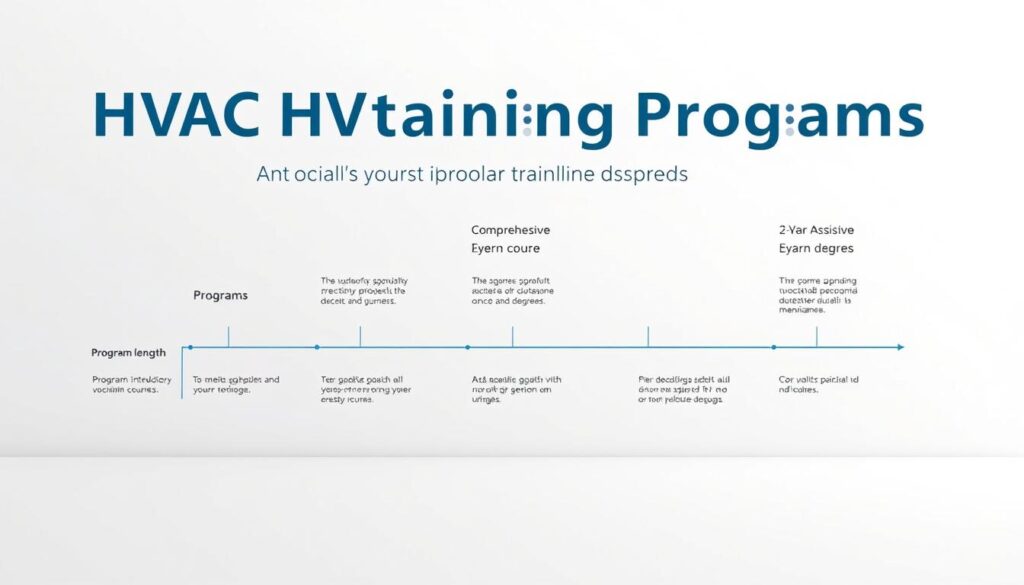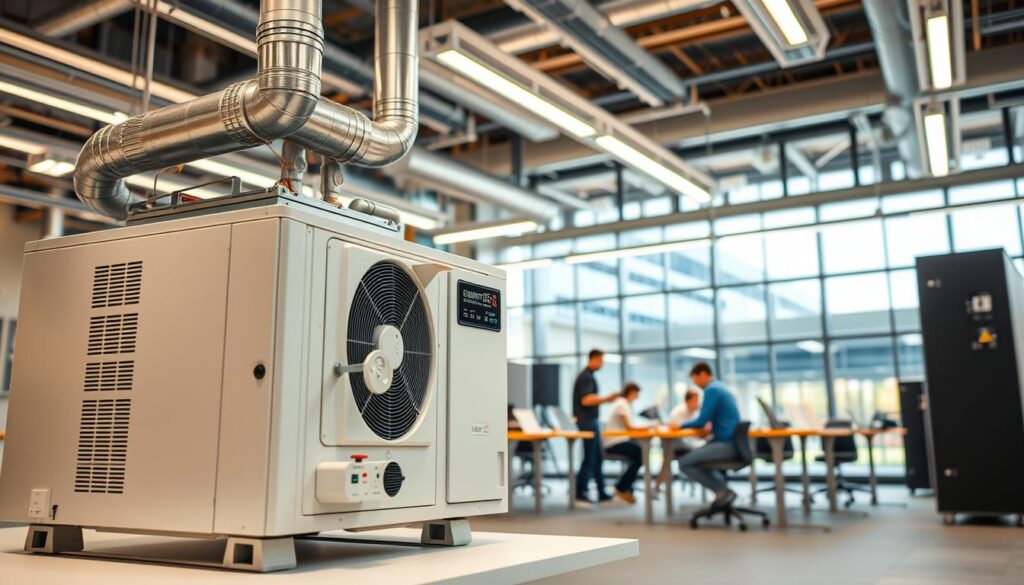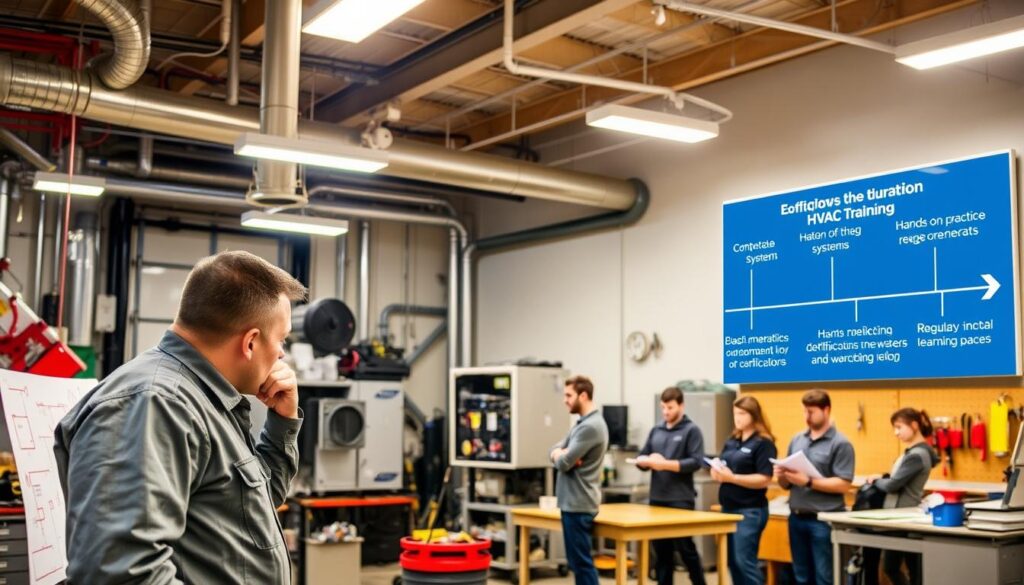Affiliate Disclosure
HVAC Guide Guys is a participant in the Amazon Services LLC Associates Program, an affiliate advertising program designed to provide a means for sites to earn advertising fees by advertising and linking to Amazon.
How Long Do HVAC Classes Take? Are you curious about starting a career in heating, ventilation, and air conditioning? HVAC training programs can be surprisingly quick. You can finish them in as little as 6 months or up to 4 years for more advanced certifications.

Knowing how long HVAC classes last is key to planning your career. The HVAC field has many educational paths. You can choose from certificate programs to associate degrees, fitting your schedule and learning style.
Schools like Apex Technical School and CBT Technology Institute offer fast training. Their programs last from 7 to 20 months. They mix classroom learning with practical experience, getting you ready for a career in HVAC.
Key Takeaways
- HVAC training programs range from 6 months to 4 years
- Certificate programs offer fastest entry into the field
- Hands-on experience is key in HVAC training
- Program length depends on your career goals
- Employment for HVAC technicians is growing steadily
Table of Contents
Understanding HVAC Education Pathways
Exploring HVAC education means looking at the many training options. Your path into this field depends on your goals and personal situation. You need to pick a program that fits your needs.
Types of HVAC Training Programs
The length of HVAC programs varies. You have several options to start your career:
- Certificate Programs: Last 6-12 months
- Associate Degree Programs: Take 2-3 years
- Apprenticeship Programs: Last 3-5 years
- Diploma Programs: Offer 1 year of training
Accreditation Requirements
Choosing an accredited program is key. Look for schools recognized by groups like HVAC Excellence or NATEF. Accreditation means you get quality education that meets industry standards.
Program Prerequisites
Before starting, most programs need:
- High school diploma or GED
- Be at least 18 years old
- Basic math and science skills
- A valid driver’s license
- Be physically fit for technical work
Your choice of program affects your learning and future in HVAC.
Explore Our HVAC Shop
Looking for top-rated HVAC tools, parts, and accessories? Visit our shop and find the perfect solution for your needs.
Visit the ShopHow Long Do HVAC Classes Take: Program Duration Overview
When looking into HVAC education, you’ll find many program lengths. These vary from short six-month certificate programs to longer two-year associate degree paths.
Your path in HVAC training depends on your career goals. Here’s a look at typical program lengths:
- Certificate Programs: 6-9 months
- Trade School Programs: 6-15 months
- Associate Degree Programs: 18-24 months
- Apprenticeship Programs: 3-5 years
Several factors influence your HVAC training duration. Some programs focus on technical skills, while others include general education. Your choice affects both study time and the depth of your knowledge.
Employers now see the value in formal HVAC training. With today’s complex systems, a good education is key. Most programs help you get certified, like the EPA Section 608 refrigerant handling credential.
Invest in your education wisely – the right HVAC training can open doors to a rewarding technical career.
Think about your personal situation, career goals, and available time when picking an HVAC program. Whether it’s a quick certificate or a deeper associate degree, each path brings valuable skills for your HVAC career.
Certificate Programs: Fast-Track to HVAC Career
If you want to start your HVAC career fast, certificate programs are a great choice. They offer a quick way to learn the skills you need. You can get ready to work in about 9 months.
Certificate programs are for those who want to get into HVAC quickly. They cover all the technical skills and practical knowledge you need. This helps you become a skilled entry-level technician.
Program Structure
A typical HVAC certificate program includes:
- Fundamental HVAC system theory
- Hands-on equipment training
- Refrigeration system diagnostics
- Electrical systems understanding
- Safety protocols and procedures
Essential Certification Requirements
To finish your certificate program, you’ll need to get a few key certifications:
- EPA 608 Certification (usually costs about $10)
- OSHA safety training completion
- Practical skills assessment
- Final exam
“Certificate programs provide a focused, efficient path to launching your HVAC career with practical skills and essential certifications.” – Industry Training Expert
These programs have a 70% completion rate. They offer a clear path into a growing field. HVAC technician jobs are expected to grow 9% from 2023 to 2033. It’s a great time to start your career.
Explore Our HVAC Shop
Looking for top-rated HVAC tools, parts, and accessories? Visit our shop and find the perfect solution for your needs.
Visit the ShopAssociate Degree Programs in HVAC Technology
An associate degree in HVAC technology is a great way to start your career. These two-year programs dive deep into technical skills and professional knowledge. They go beyond what you learn in basic certificate training.

Getting an HVAC certification through an associate degree takes two years. You’ll learn a lot of technical skills. These skills prepare you for many jobs in the industry.
- Comprehensive curriculum covering system design
- Hands-on training in state-of-the-art laboratories
- Preparation for multiple career paths
Potential career opportunities for graduates include:
| Career Path | Average Salary |
|---|---|
| HVAC Technician | $53,000 |
| HVAC Project Manager | $65,000 |
| Refrigeration Specialist | $58,000 |
Investing two years in an associate degree can significantly enhance your professional prospects in the HVAC industry. With a 14.7% growth rate expected, this path offers great long-term career chances.
“An associate degree provides the foundation for a robust and dynamic career in HVAC technology.” – Industry Expert
HVAC Apprenticeship Timeline and Requirements
HVAC apprenticeships are a great way to become a skilled technician. They mix hands-on experience with classroom learning. This gives you a solid base in HVAC training that usually lasts four years.
An HVAC apprenticeship is a structured way to learn the trade. It combines practical work with technical classes. Your path will include two main parts:
- On-the-job training with experienced professionals
- Classroom instruction covering technical skills
On-the-Job Training Hours
You’ll gain important work experience during your apprenticeship. You’ll do 8,000 hours of on-the-job training, which is about 2,000 hours a year. This hands-on experience helps you learn real-world skills with professional guidance.
Classroom Instruction Components
The program also includes classroom training. Apprentices must finish 576 total instruction hours, with at least 144 hours each year. These classes teach you about:
- HVAC system design
- Electrical principles
- Refrigeration technologies
- Safety protocols
Apprenticeship Completion Requirements
To finish your apprenticeship, you must meet certain requirements. You need to complete all training hours, pass technical tests, and show you’re skilled in HVAC.
Apprenticeships offer a chance to earn while you learn. You get valuable industry experience and credentials at the same time.
Explore Our HVAC Shop
Looking for top-rated HVAC tools, parts, and accessories? Visit our shop and find the perfect solution for your needs.
Visit the ShopFactors Affecting HVAC Training Duration

Your HVAC course timeline isn’t fixed. Many things can change how fast you finish your training. Knowing these factors helps you plan your HVAC classes better.
What you know before starting matters a lot. If you already know a lot about mechanics or technology, you can learn faster. How quickly you learn and how hard you try also affects your time to get good at HVAC skills.
- Prior technical experience
- Personal learning aptitude
- Study mode (full-time vs part-time)
- Program complexity
- Certification requirements
The kind of HVAC training you pick changes your study time. Short-term certificate programs usually last from 6 months to 1 year. But, if you choose a full associate degree, it might take up to 2 years.
“Your dedication and learning approach determine how quickly you’ll master HVAC skills.”
Things outside of school also play a part. Like your job, how much money you have, and where you can study. Some students might have to study part-time because of work. This can make their training last longer.
| Program Type | Typical Duration | Flexibility |
|---|---|---|
| Certificate Program | 6-12 months | High |
| Associate Degree | 2 years | Medium |
| Apprenticeship | 3-4 years | Low |
By knowing these things, you can plan your HVAC classes well. You can pick a training path that fits your goals and life.
Core Curriculum and Skills Development Timeline
Your HVAC school curriculum is designed to teach you key technical skills and knowledge. Knowing the hvac education requirements helps you get ready for a career in this field.
HVAC training programs aim to build a strong skill set through structured learning. Students go through a journey that mixes theory with hands-on practice.
Technical Skills Training
Technical skills training covers important areas of HVAC technology:
- Construction blueprint reading
- Advanced electrical circuitry
- HVAC system diagnostics
- Refrigeration system maintenance
Theoretical Knowledge Components
Your theoretical learning will cover key concepts such as:
- Thermodynamics principles
- Air distribution systems
- Energy efficiency standards
- Equipment design fundamentals
Hands-on Practice Requirements
Practical training is key in HVAC education. Students usually do:
| Practice Area | Estimated Hours |
|---|---|
| Laboratory Simulations | 120-180 hours |
| Field Equipment Training | 100-150 hours |
| Professional Workshop Experiences | 80-120 hours |
Most HVAC training programs last 6 to 12 months. They give you the skills needed for a successful technical career.
Explore Our HVAC Shop
Looking for top-rated HVAC tools, parts, and accessories? Visit our shop and find the perfect solution for your needs.
Visit the ShopExplore Our HVAC Shop
Looking for top-rated HVAC tools, parts, and accessories? Visit our shop and find the perfect solution for your needs.
Visit the ShopCareer Advancement Opportunities After Training
After finishing your HVAC technician training, you’ll find many ways to grow in your career. The HVAC field has many chances for advancement, from entry-level to specialized roles. Getting your HVAC certification can lead to jobs like field service supervisor or even business owner.
Your salary will increase as you gain experience. New technicians start at about $22.47 an hour. With time, they can earn up to $32.83 an hour. You can also explore areas like automotive HVAC, refrigeration, and solar technology for more career paths.
Getting certified by groups like North American Technician Excellence (NATE) can boost your career. The HVAC industry is expected to grow 13% from 2018 to 2028. This means your training is a smart investment for the future.
Continuing your education and getting more certifications can lead to better-paying jobs. HVAC technicians make an average of $50,590 a year. With experience, you could earn even more. Your training is just the start of a rewarding career in a vital industry.
FAQ
How long does it typically take to complete an HVAC training program?
What are the different types of HVAC training programs available?
Do I need any prior experience to start an HVAC training program?
What can I expect to learn in an HVAC training program?
Are online HVAC training programs available?
How much does HVAC training typically cost?
How long does it typically take to complete an HVAC training program?
What are the different types of HVAC training programs available?
Do I need any prior experience to start an HVAC training program?
What can I expect to learn in an HVAC training program?
Are online HVAC training programs available?
How much does HVAC training typically cost?
FAQ
How long does it typically take to complete an HVAC training program?
HVAC training program lengths vary. Certificate programs can last 6 months. Associate degree programs usually take 2 years. Apprenticeships can last from 3 to 5 years. Your time will depend on your program and study schedule.
What are the different types of HVAC training programs available?
There are several HVAC training options. Certificate programs offer quick entry. Associate degrees provide more in-depth training. Apprenticeships combine classroom learning with hands-on experience.
Do I need any prior experience to start an HVAC training program?
Most HVAC programs have few requirements. You need a high school diploma or GED. Basic math and science skills are also necessary. Prior experience is helpful but not required.
What can I expect to learn in an HVAC training program?
HVAC programs teach a lot. You’ll learn about electrical systems, refrigeration, and heating and cooling. You’ll also study system design, installation, and repair. Safety and blueprint reading are also covered, along with hands-on experience.
Are online HVAC training programs available?
Yes, online or hybrid HVAC programs are available. But, HVAC is a hands-on field. Online programs focus on theory, while practical skills are learned in labs or workshops.
How much does HVAC training typically cost?
HVAC training costs vary. Certificate programs can cost
FAQ
How long does it typically take to complete an HVAC training program?
HVAC training program lengths vary. Certificate programs can last 6 months. Associate degree programs usually take 2 years. Apprenticeships can last from 3 to 5 years. Your time will depend on your program and study schedule.
What are the different types of HVAC training programs available?
There are several HVAC training options. Certificate programs offer quick entry. Associate degrees provide more in-depth training. Apprenticeships combine classroom learning with hands-on experience.
Do I need any prior experience to start an HVAC training program?
Most HVAC programs have few requirements. You need a high school diploma or GED. Basic math and science skills are also necessary. Prior experience is helpful but not required.
What can I expect to learn in an HVAC training program?
HVAC programs teach a lot. You’ll learn about electrical systems, refrigeration, and heating and cooling. You’ll also study system design, installation, and repair. Safety and blueprint reading are also covered, along with hands-on experience.
Are online HVAC training programs available?
Yes, online or hybrid HVAC programs are available. But, HVAC is a hands-on field. Online programs focus on theory, while practical skills are learned in labs or workshops.
How much does HVAC training typically cost?
HVAC training costs vary. Certificate programs can cost $1,500 to $15,000. Associate degree programs are $10,000 to $30,000. Apprenticeships are often cheaper, as you earn while you learn. There are financial aid and payment plans to help with costs.
What certifications do I need after completing my HVAC training?
After training, you’ll need EPA Section 608 Certification for refrigerants. Many technicians get NATE certifications for advanced skills. State licensing may also be needed.
Can I work while completing my HVAC training?
Many HVAC programs offer flexible schedules. This allows you to work while studying. Apprenticeships are great for working, combining paid training with classroom learning.
What is the job outlook for HVAC technicians?
The job outlook for HVAC technicians is good. The U.S. Bureau of Labor Statistics predicts a 5% growth rate from 2021 to 2031. New construction and energy efficiency upgrades drive this growth.
How quickly can I start working after completing my HVAC training?
After a certificate or entry-level training, you can start working in 6-12 months. Apprenticeships take longer but offer more training. Many find jobs quickly, thanks to high demand.
,500 to ,000. Associate degree programs are ,000 to ,000. Apprenticeships are often cheaper, as you earn while you learn. There are financial aid and payment plans to help with costs.
What certifications do I need after completing my HVAC training?
After training, you’ll need EPA Section 608 Certification for refrigerants. Many technicians get NATE certifications for advanced skills. State licensing may also be needed.
Can I work while completing my HVAC training?
Many HVAC programs offer flexible schedules. This allows you to work while studying. Apprenticeships are great for working, combining paid training with classroom learning.
What is the job outlook for HVAC technicians?
The job outlook for HVAC technicians is good. The U.S. Bureau of Labor Statistics predicts a 5% growth rate from 2021 to 2031. New construction and energy efficiency upgrades drive this growth.
How quickly can I start working after completing my HVAC training?
After a certificate or entry-level training, you can start working in 6-12 months. Apprenticeships take longer but offer more training. Many find jobs quickly, thanks to high demand.

